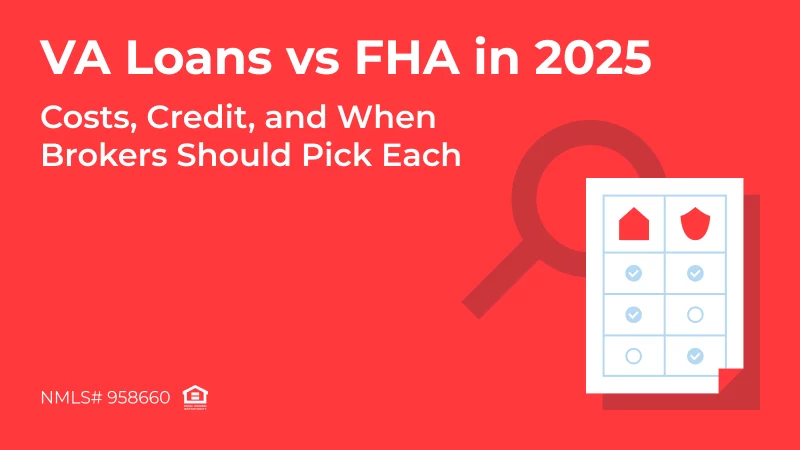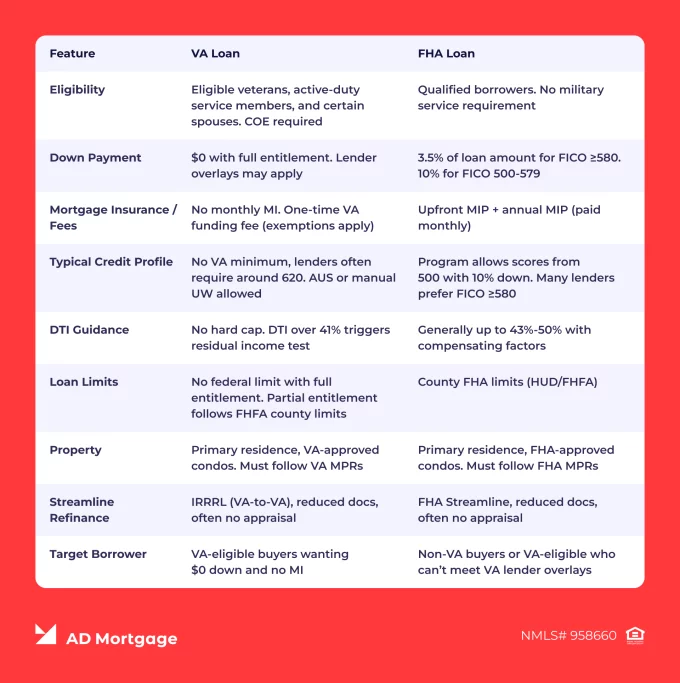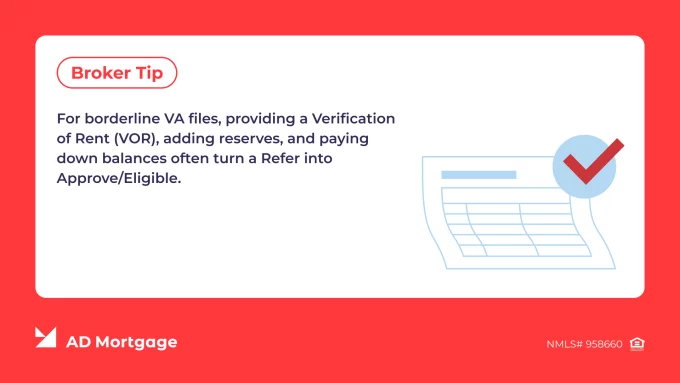
When evaluating two government-backed benefits, FHA loans vs VA loans, two major differences stand out. First is eligibility. While FHA loans are offered to the general public, VA loans are reserved for military members, veterans, and eligible family. Secondly there are the associated costs. FHA loans require a down payment and mortgage insurance premium (MIP), whereas VA loans require a one-time funding fee.
To help brokers choose the best program for their clients, we will thoroughly explore these two types of mortgages. In this article, you will find a one-screen comparison table, a four-step decision flow, and an overview of AD Mortgage programs tailored to specifically to your clients’ needs.
FHA vs. VA at a Glance: Broker Table
Compared to conventional loans, FHA and VA loans are especially attractive to first-time, low-income borrowers. These programs require no or low down payment, offer competitive interest rates, and allow lower credit scores.
The table compares VA and FHA loans side by side to clearly highlight the differences between them.

How Brokers Can Decide in Four-Step Guide for Calls
The following four-step plan will help brokers quickly decide whether FHA or VA loans suit a client better.
- Confirm eligibility. If the borrower is VA-eligible and has the Certificate of Eligibility (COE), then a VA loan is preferable. Otherwise, choose an FHA loan.
- Compare total monthly costs. For VA loans, there are no MI payments, but include the funding fee keeping in mind exemptions. For FHA loans, count upfront and annual MI costs. Run both options in Quick Pricer to compare conditions for an individual case.
- Check file strength. Evaluate two key parameters:
– Credit. VA-eligible borrowers with a lower credit score can be evaluated through AUS. If AUS results in a ‘Refer’, residual income or manual underwriting might be needed. For FHA loans, a FICO score over 580 qualifies for 3.5% down. With a FICO of 500-579, borrowers can qualify with 10% down.
– DTI. For VA loans, DTI over 41% triggers residual income verification. FHA loans may allow higher DTI but with compensating factors. - Pick streamline path (if refinancing). Borrowers with an existing VA loan can apply for a VA IRRRL, while those with an existing FHA loan can use the FHA Streamline Refinance program.

Key Costs to Explain to Your Clients
These three key points help a borrower clearly understand the difference between FHA and VA loan costs:
- VA Costs. While $0 down payment is possible and no monthly MI is required, a one-time funding fee is mandatory. This charge can be paid upfront or rolled into the loan. However, exemptions may apply.
- FHA Costs. MIP (typically, 1.75% of the loan amount) is required upfront and can be financed into the loan. The annual MIP is paid monthly together with mortgage payments. Depending on the down payment size and case number assignment date, MIP might be canceled.
- Loan Limits. With full VA entitlement, there are no loan limits imposed by the VA. FHA loans are subject to county loan limits – published annually by FHFA and HUD – which vary based on the location and property type.
AD Mortgage Programs: What We Offer
AD Mortgage offers over 20 loan programs to help clients achieve homeownership. If your client is choosing between VA and FHA loans, we have several options:
- VA Standard offers loans up to $2 million with no down payment and limited closing costs. Family homes up to 4 units, townhouses, VA-approved condos, newly-built homes, and manufactured homes are available.
- VA IRRRL is the VA-to-VA streamline refinance program. It often doesn’t require appraisal, and the documentation needed is limited.
- FHA Standard is ideal for first-time buyers who want to purchase a primary residence with potentially lower interest rates and reduced monthly payments.
- FHA Streamline Refinance is for borrowers with existing FHA loans who want to refinance on better terms. The eligibility requirements are simple, and the paperwork is minimal.
- FHA High Balance helps with a purchase in an expensive area. The program is accessible to borrowers without a perfect credit score or history.
Submit a loan scenario and our VA/FHA specialist will contact you to help choose the best program for your client.
FHA vs VA: Common Myths Brokers Should Clarify
These common misconceptions about FHA and VA loans often make communication difficult. Brokers should debunk the myths early on and use this opportunity to educate their clients.
- “VA loans always take longer to close.” Clean files close on standard timelines, comparable to FHA and conventional loans. Delays usually come from missing documents or mistakes.
- “Sellers pay more with VA loans.” Although the VA caps certain fees that veterans can be charged, sellers do not pay extra automatically. However, seller concessions are allowed within 4% of the loan amount.
- “FHA loans are for first-time buyers only.” FHA loans are available to anyone who qualifies and there is not a first-time buyer requirement.
FAQ: FHA Loan vs VA Loan
Which Program is Cheaper over 5-7 Years?
For VA-eligible borrowers, VA loans are almost always cheaper than FHA loans due to no VA down payment, no monthly MI, and lower long-term costs.
What are VA vs FHA Credit Score Requirements?
The VA does not set a minimum credit score, but lenders typically require around 620. For FHA loans, a FICO score over 580 qualifies for a 3.5% down payment and 500-579 qualifies for 10% down.
Do VA Loans Have PMI?
No. VA loans do not require private mortgage insurance (PMI). However, they have a one-time VA funding fee, though exemptions may apply.
Do FHA Loans Have Loan Limits?
FHA loans are subject to county loan limits by FHFA/HUD, which vary depending on property type and location.
Can I Do a Streamline Refinance (IRRRL vs. FHA Streamline)?
Yes. Eligible borrowers with existing VA loans can refinance with IRRRL, and eligible borrowers with existing FHA loans can refinance with FHA Streamline options.
When Would FHA Beat VA for a VA-Eligible Borrower?
Although VA loans usually win for eligible borrowers, FHA loans can be better when AUS findings return a Refer or when a borrower’s DTI is too high and triggers a residual income test.
Key Takeaways
- For VA-eligible borrowers, VA loans usually win as they do not require a down payment or monthly MI.
- FHA loans are a great option for those who don’t meet VA or conventional requirements needing credit and DTI flexibility with 3.5% down.
- Pricing and eligibility may differ so always run both VA and FHA options. Submit a scenario now to confirm overlays.
- When refinancing, stay in program: IRRRL for existing VA loans and FHA Streamline for existing FHA loans.
Conclusion
Comparing VA and FHA loans, the VA benefits win in most cases for eligible borrowers. These loans come without a down payment or mortgage insurance but require a funding fee.
FHA loans are a strong option for non-VA eligible borrowers as the program allows credit score and DTI flexibility.
To choose the best program for your client, compare several options by submitting a scenario.



